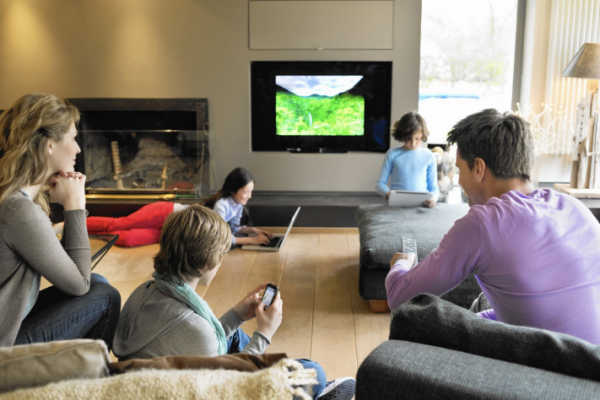
Happy Father’s Day—Here’s Sage Advice For Parents On Groundhog Day
Happy Father’s Day—here’s sage advice for parents on Groundhog Day.
The parenting task on any given day can be so repetitive and mundane—like the tedious day in the movie Groundhog Day—that we lose our wonder and alertness in it all.
(Relief! You may have thought I was going to compare a father to a groundhog.)
What we need is sage advice—in this case, the sage I refer to is my wife, Julie—to rejig our entire approach to it.
I was talking to another sage—an older spiritual man—the other day. He tells me, God’s voice sounds like my wife’s.That’s true to my own experience, too—no one on earth has been a greater source of wisdom to me than she has. As my life’s witness, she is privy to the whole picture—and thus gives the most apt advice.
Anyway, she came back recently from a three-week retreat, after enjoying the unprecedented chance to deeply reflect on life itself and how we are doing as co-parents of our five kids. Before this solo trip, she’d never been away from our kids for more than three days. Having sat in a mountain chalet on her own for a week, and seeing things more clearly than ever, she reminded me that the years with our kids are flying by.
She then gave me six bits of condensed Jedi-level advice.
Before I may have argued back on some points, but wiser man that I now am, I instantly agreed with everything she said. And we then got chatting about how to implement it.
Fellow parent, you might be so busy right now that you can’t tell the trees from the forest. I know this feeling well, so I thought I’d share her six bits of advice with you, too:
1. “Let’s create, prize and protect daily together moments.“
Especially every week-day in a family is Groundhog Day—there’s certain, recurring things that have to happen so we don’t lose our jobs or fail our grades. But if we parents are merely in functional (or survival) mode, we too easily miss the opportunities to emotionally connect with our kids.
Especially those few hours before bedtime are mostly all we working parents have with our kids for most days in a year, and they’re already filled up with tasks and routines. So how do you create daily bonding moments? You might come up with your own ideas, but here’s ours:
- Be home by, or close computers, by 5pm—change gear from work-focus to family-focus on the instant.
- Stay off our phone and emails till after kids bedtime (and preferably till the next day.)
- Go for a walk together or play in the garden.
- Choose your preferred atmosphere—play that kind of music.
- Make a fire together (now that it’s Winter).
- Enjoy dinner together and chat (using questions sometimes).
- Read, chat, pray and cuddle with them at bedtime.
Small as these kinds of changes are, they make a big difference. They create the environment that most naturally allows bonding moments.
2. “Let’s limit what we say yes to outside this family.“
My seven-year old Sam, beautifully sentimental, burst into tears the other day as he remembered again his fourth birthday party—Daddy, that’s the one you missed. True—I was on a work trip. An elephant and Sam never forgets.
Likewise, Julie still tells me with sadness how, when our daughter was born, I was out for three or four nights a week because of work demands that I had agreed to even though they were avoidable: It wasn’t just Ivy who missed out on her dad in her first year, she laments, It’s you who missed out on her first year.
Whenever we say yes to something, we say no to something else. We know this already. But for some reason, we don’t take the time to name exactly what it is we’re consequently saying no to. If we did, we’d realize that most often it’s our family that pays the price.
My friend has recently decided to leave a high flying job because it has consumed his life. His new goal, he told me at a friend’s birthday party, is to learn to attend more to his kids. Earlier on the day he told old me this, he said he’d come out the bathroom and his boy was lying on the bed. Usually he would have left the room, but something registered: Wait, my son never lies on my bed—has he been waiting for me? New to the art of attention, he lay down next to his son. What’s up, my boy? What followed was a memorable conversation. How many hundreds of these connection moments have we missed over the years? my friend asked me.
3. “Lets’ limit our emotional investment elsewhere.”
As important as spending time with kids is, it’s also crucial that we have enough emotional bandwidth to actually be present to them. Our bodies may be in the room, but our minds are elsewhere.
I am sad to say it—I have spent weeks, sometimes months, at a time, completely absorbed by work challenges, relational complexities, or justice issues that I am passionate about. And sure, as long as we care about our work, our relationships, our world, it’s inevitable that we will and must invest our lives in these.
But when things get hard or complicated, we must learn to draw a line somewhere: I will give this much of my mind and time to this concern, but no more. If we don’t, we can fall so far down the rabbit hole, that our kids (and spouses) are left with an over-embattled, empty shell of human, less capable of enjoying the present moment or those we are sharing it with.
If a beach can hold back the entire ocean, then we can also draw the line somewhere to hold back the chaos—we may not have control of the problems in the world, but we do have some control of how much these problems will distract us from the unrepeatable opportunity to love and lead the only humans who (for a time at least) believe we are the heroes of the world.
Besides, even if we could save the world (we can’t) what good is it if we lose our family in the process?
4. “Let’s get a little more organized.”
Julie and my parenting strength is also our weakness—we’re very flexible people. When people ask me how we have survived parenting five kids on top of full time jobs, I say: Blessed are the flexible for they shall no be broken.
Parenting children, especially small ones, will trip you and tackle you when you least expect it, I explain, but make sure that as you hit the ground, you roll with it and not slam into it.
This flexible, go-with-the-flow approach has served us well. But there’s a negative side, too: if we’re disorganized, it creates needless amounts of extra work that stress us out, and the kids who especially need more structure to thrive, don’t. Since Julie has come back we’ve introduced some more life-giving structure into our week.
For example, we’ve introduced three important time slots on a weekend:
- Golden hour—when everyone takes mandatory solo time, with zero interaction or screens allowed. Everyone, even the extroverts, need to learn to touch base with themselves.
- Chore hour—when we divide-and-conquer a list of house-related things to do. Getting kids to do chores at different times has been impossibly complex for us.
- Week ahead—on Sunday nights, there’s a quick pep-talk for and run-down of the week ahead. Nobody likes to fly blind into a week.
So far, so good, but since we’re flexible, we’ll probably adjust these at times gone.
5. “Let’s enjoy our kids more.”
Confession: I wouldn’t say that spending time with my kids is always the most stimulating experience. To be honest, their company sometimes bores or drains me. Although I am a public person, I get much of my energy from being alone. This has caused me to conclude, To have more to give my family, I need more time away from my family.
But recently a more seasoned parent challenged me, If you can more often learn to change your mode from parent-in-charge to fellow-traveller of these fantastic humans, you might learn to enjoy them more, even be nourished by them.
I’d never heard advice like this before, but since I have been working on it—seeing my family as seven people divinely lumped together in a shared adventure called Life—I have gained fresh interest in my kids and in their daily experiences. Parenting is not just what I pour into my kids, but what they pour into me—if I poise myself to enjoy them, that is.
But learning to attend to each other is a path few people nowadays tread. Smart phones and Netflix, weapons of mass distraction, now offer us an unceasing escape from the ordinariness of the hour. But mundanity is the other side of the coin to magic. To avoid the one is to forfeit the other.
Mundanity-and-magic-in-the-present-moment is all that we actually have. It’s also the only place where we can learn to find joy in each other.
6. “Our kids are growing up at the perfect speed.”
If I had dropped a coin in a jar every time I heard someone say, “My kids are growing up too fast” I could buy the latest model of my phone by now.
But Julie reminds me of something a sage parent once shared with us: Your kids grow up at the perfect speed. There’ll be plenty of mundanity and challenges along the way, but never wish those times away. Learn to enjoy your kids every step of the way. It only seems too fast if you’re missing it as it happens.
True, the years are flying by—I can’t believe my oldest one is already a teen. But we’re also noticing that we can get better at Groundhog Day, and it does not repeat forever.
Especially when we create and prize daily together-moments; limit what we say yes to outside the family; get more organised; and intentionally find more joy in our kids, that each day is packed—not only with daily demands and the herding of kids, but also with wonderfulness and love.
Comments
Also published on Medium.




